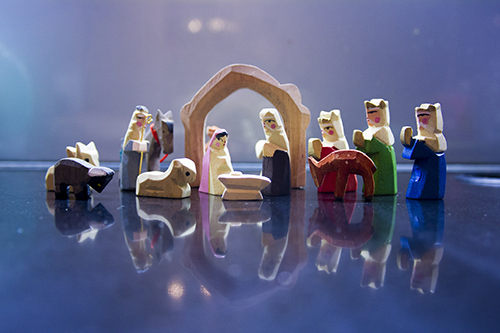Week of September 27
Text:
Luke 5-6
Summary:
Luke begins his account of Jesus’ earthly ministry with examples of action Jesus did that were contradictory to the expectations of the Pharisees and teachers of the law. These actions lead into Jesus’ Sermon on the Plain, which echoes the ideas found in Matthew’s version of the Sermon on the Mount.
Text Notes:
Out text opens with Jesus preaching to a crowd from a boat. It appears that the logistics of being able to row out a bit from shore allowed Jesus a better vantage point from which to preach. It may be interesting to note that we are not told what Jesus taught this day—just that he did teach the people. The point of Luke’s inclusion of the story was not the content, but rather, the fact that Jesus demonstrates his power to Peter and then calls him to follow. Peter recognizes the power in Jesus’ actions (Notice that he goes from calling him “Master” to “Lord.”) and leaves everything behind to follow Jesus.
The next five stories contain Jesus doing things I would call “all wrong,” that is, he does things contrary to what the Jewish people would expect from a good Jew, especially a good Jewish rabbi or teacher. Certainly Luke includes these stories to demonstrate the fact that Jesus’ actions do not always align with that of the Jews, yet they still demonstrate the power of God.
First is a story of Jesus healing a man with leprosy. Leprosy was not necessarily Hansen’s disease, but rather any skin ailment. The issue for the Jewish people was laws that prohibited someone with leprosy to be included in everyday societal life, since doing so might result in a possibility of being declared unclean. (It seems the issue was not so much catching some disease as being declared unclean and therefore unable yourself to participate in the worship practices of the day.) Jesus does more than allow this man to approach him, he touches the man. This would result in Jesus himself being considered unclean, but the issue never comes up in Luke’s narrative. What is noted is that news of Jesus spreads far and wide, resulting in the need for Jesus to take regular time to withdraw to solitary places and pray.
The second story is one of a paralyzed man who is brought to Jesus on a mat carried by friends. Jesus not only heals the man, but uses this healing as a demonstration of Jesus power over illnesses, as well as sin. Again, to declare forgiveness for sins would have been against the Jewish law: it was blasphemy to claim a power that only God held. Of course, we understand that Jesus was God, but the Pharisees obviously did not.
Jesus was not only willing to forgive others of sin, he was also willing to spend time with sinners. The reason this even comes up is the frustration of the Pharisees and teachers of the law that Jesus is doing this “all wrong.” While we may think it is not strange for Jesus to be seeking those who were “sick,” as he describes them, we too tend to find people who look more church-like than sin-like. Jesus’ actions serve to point out a need for our focus to be beyond just those who follow Christ to perfection.
Jesus’ examples of acting in ways contrary to Jewish faith continues with a story of Jesus questioned about fasting (Jesus says to celebrate while the bridegroom is with you) and one about him healing on the Sabbath (It is better to good and save life than to do nothing, which Jesus equates to evil, and destroy a life.)
Jesus spends a night praying to God. While Luke never explicitly says his time in prayer was to prepare for the choosing of the twelve apostles, there can be little doubt that was the purpose. When morning came, he selects twelve, for whom we are given their names. It is important for us to be recognize the need of prayer in decisions we make, if only for the ability it gives us to be more centered on God and his purposes.
Luke’s version of Jesus’ “Sermon on the Mount” is known as the “Sermon on the Plain” in Luke’s gospel. Luke’s sermon is shorter than the one in Matthew, although it does contain the same material.
Jesus has four “Blessed…” statements, along with four “Woe…” statement. Matthew does not include any woes, but Luke’s woes do echo some of the statements we see in Matthew’s version. Both sermons conclude with a statement about builders, pointing to the truth that disciples are those who do what Jesus says to do. This too is found in both sermons.
Discussion Questions:
Every week our lessons will include seven questions (really question sets) that you may either pick and choose those questions that best suit your family unit, or you may use one question set for each day.
- In what ways do you think it would have been difficult for the man with leprosy to approach Jesus and ask for healing? In what ways do we find ourselves excluded or outcast because of things in our life? How does Jesus offer us healing? Why do you think Luke includes the fact that Jesus often sought lonely places to pray? How should this be an instruction for us to do the same? (Luke 5.1-16)
- What were the friends of the paralytic men seeking for their friend? In what ways did they receive much, much more? There are three stories here where Jesus does things that are unexpected. Why were Jesus’ actions so surprising? In what ways do you find Jesus doing things today that many would consider unusual? In what ways have you done things that would be considered unusual in the name of Jesus? (Luke 5.17-39)
- One of the things that surprised people was Jesus’ actions on the Sabbath, which went against the Jewish regulations of the day. In what ways have you seen people attempt to ensure they are following Jesus only to discover they have created rules and regulations that force people to follow the rules rather than Jesus? In what ways have you done good, even when it seemed to go against the grain of the norms of the day? (Luke 6.1-11)
- What do Jesus’ actions prior to selecting his 12 apostles instruct us about how to go about making decisions in our own life? In what ways do you think spending time in prayer helps prepare you to make important decisions? Why is this the case? (Luke 6.12-16)
- This passage is know as the Sermon on the Plain (in contrast to Matthew’s Sermon on the Mount), but it contains much of the same teaching. When you read the blessings that are listed in this passage, how do you think the people listening to Jesus heard these comments? In what ways are these words prescriptive (that is, telling the people how they are to act) versus being descriptive (telling people who they are and how they are blessed even in spite of their standing)? What blessing or woe stands out the most to you from this passage and why? (Luke 6.17-26)
- Why is it so difficult for us to love our enemy? How do you think society got to the point where fairness and equality in every situation became more important than love and care for one another? What is the worst thing that can happen to you if life is not fair? In what ways can you do something for others in such a way as to avoid being repaid for your kindness toward them? (Luke 6.27-36)
- Do you find Jesus words in this section comforting or anxiety inducing? Why might it be easy to see these instructions as a warning to us? How often do you reflect on the ways your life shows your love for God? In what ways do you think you would see things you need to change, were you to spend time reflecting on the fruit your life produces? (Luke 6.37-49)
Activities:
Every week this section will list possible activities you and your family unit can do. You may pick one or perhaps do several during the course of a week. All are intended to be suitable for any age.
- Research the rules and regulations the Jewish people had for the Sabbath. How does Jesus’ actions compare to these regulations? Based on this, do you think those opposed to Jesus had a valid point to oppose Jesus’ treatment of the Sabbath?
- Compare the “Blessings” and “Woes” listed in Luke 6.20-26. How do they compare with one another? Do you find them congruent or unrelated? Why do you think Jesus selected these blessings and woes to list here? Now, how does this sermon (The Sermon on the Plain) compare to Matthew’s Sermon on the Mount (Matthew 5-7).
- Make a list of the groups of people you might consider today’s version of “lepers.” You might even go so far as to use the standards of your own group of friends as part of the criteria to determine who is “in” and who is to be sent to the outside of the “city,” so that they do not contaminate your circle of people or the people around you. What specific thing can you so to help touch and heal those who find themselves in this predicament?
- To help understand the efforts the friends of the paralytic went through to bring him to see Jesus, create a mat or cot that can be carried using handles or ropes and carry someone around for a few minutes. [NOTE: Please do this in such a way that you exercise care and caution!] After having done this, reflect on how you read the story of the paralytic in a different way.
- Who are the sinners Jesus is calling you to go to. Go to them.
- Before any decision you make this week, spend some time in prayer before you actually make the decision. Some decisions may matter little as far as having Kingdom implications (I am not sure whether God has an opinion as to your food choice for tonight.), but the practice of praying before all decisions allows us to be better equipped and focused on listening to a word from the Lord.
Connect:
Find lessons, posts about the passages we are studying, and more information at 1homebiblestudy.org.
Find more information about our 1 Groups at 1groups.com.
Find out more information about South Plains at southplains.org.
Follow us on Twitter and Instagram at @southplainscofc
Tag your posts with #1hbs.
 This work by South Plains Church of Christ and Robert A. Anderson is licensed under a Creative Commons Attributions-NonCommerical-NoDerivatives 4.0 International license.
This work by South Plains Church of Christ and Robert A. Anderson is licensed under a Creative Commons Attributions-NonCommerical-NoDerivatives 4.0 International license.
Scripture quotations taken from The Holy Bible, New International Version® NIV® Copyright © 1973, 1978, 1984, 2011 by Biblica, Inc. ™ Used by permission. All rights reserved.

 Week of September 20
Week of September 20
